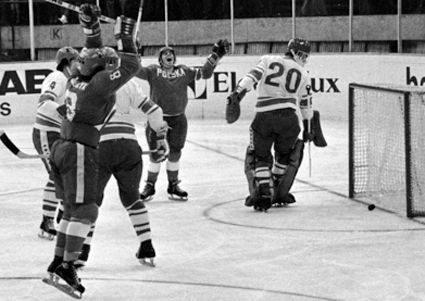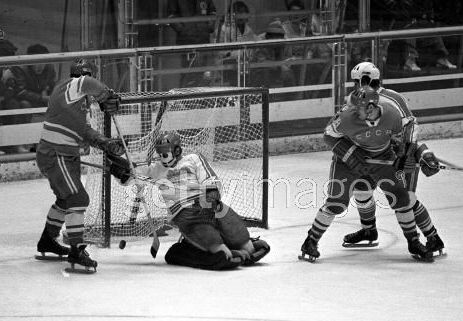Friday, April 8, 2011
1997-98 Poland National Team Mariusz Cerkawski Jersey
On this date in 1976, the greatest upset in World Championship history occurred when Poland defeated the Soviet Union 6-4.
Just two months earlier, the Soviet Union had won it's fourth straight Olympic gold medal, which included a 16-1 defeat of Poland. And when it came to the World Championships, the Soviets had won 12 out of the last 13 championships.
The Soviet roster contained some of the most recognizable stars in international hockey history, beginning with Vladislav Tretiak in goal, defenseman Valeri Vasiliev and forwards Valeri Kharlamov, Boris Mikhailov and Alexander Maltsev among others.
Combined, this team had only lost one game since 1972, while outscoring their opposition 294-63 in the previous four major tournaments. In the last seven games in which the two countries had met, the Soviets had won by scores of 9-3, 20-0, 8-3, 17-0, 13-2, 15-1 and 16-1.
About the only things Poland had in it's favor going into the game was that the tournament was being held in Poland and it was the opening game of the tournament, perhaps allowing Poland an shot at the Soviets before they had a chance to hit their stride.
The best Poland could simply hope for was to keep the score as low as possible. A win was simply out of the question.
Believing his team would have little trouble scoring, Soviet head coach Boris Kulagin opted to leave Tretiak on the bench and started Alexander Sidelnikov in goal. The Poles thrilled the 10,000 home fans in attendance when they not only scored at 10:21 of the first period on a goal by Mieczyslaw Jaskierski, but a goal that gave them a lead. Four minutes later, lighting struck twice when Ryszard Nowinski scored again to increase the lead to two goals at the end of the first period.
Surely the Soviets were threatened with Siberian exile between periods, and began to correct the aberration that was the first period when Mikhailov scored just 31 seconds into the second period.
Rather than giving in to the inevitable, the Poles amazingly responded when Wieslaw Jobczyk made it 3-1 at 2:44, once more igniting the home fans, but before they had a chance to settle back into their seats, Jaskierski sent the arena into pure bedlam when, just 16 seconds later, he netted his second goal of the game to push the lead to three.
Kulagin had seen the error of his ways, and pulled Sidelnikov a minute later, inserting Tretiak into the game. Buoyed by the arrival of Tretiak, the Soviets got one back at 5:14 when Alexander Yakushev scored to make the score 4-2, but the now confident home team responded quickly yet again when Jobczyk's second goal of the game found the back of the net at 6:40 to restore the three goal lead. The remainder of the period was scoreless, leaving the Soviets 20 minutes to score three to tie and four to win, and based on their most recent 16-1 win just two months prior, four goals in a period was well within the Soviet reach.
During the final period, the Polish fans sang and cheered continuously, and for the first 13 minutes, their team kept the Soviets off the scoreboard until Kharlamov made it 5-3 with seven minutes remaining, but Polish goaltender Andrzej Tkacz held the Soviets at bay as the fans continued to cheer throughout.
Jobczyk completed his hat trick with 20 seconds remaining with "the Katowice arena a complete madhouse" before Kharlamov scored a meaningless goal with five seconds remaining to make the final score 6-4 before the emotional scene of the Poles and their fans filling the building with the Polish national anthem.
Wieslaw Jobczyk completes his hat trick against the Soviet Union
The Poles returned to Earth the next day with a 12-0 loss to Czechoslovakia and were eventually relegated to the B Pool at the end of the tournament, making their shocking defeat of the Soviets just that much more remarkable.
Poland played it's first international game back in 1926 and played in its first Olympics in 1928 and competed in 13 of the next 15 Olympics up through 1992, but has failed to qualify since then.
Polish goaltender Andrzej Tkacz tries to fend off Valeri Kharlamov in the 1972 Winter Olympics
Their first World Championship participation came in 1930 and a good run of form saw them finish with a series of fifth place finishes in the first half of the 1970's, but since 1977 they have generally competed in Pool B, now called Division 1, having earned five promotions to the Top Division, but never managing to stay up following their promotion. Conversely, they have never been relegated to Division 2, one of only eight countries that can make that claim.
After their best period of competitiveness from the 1950's to the 1970's, they have been passed over by several countries, especially with the breakup of the Soviet Union resulting in a number of newer, competitive countries claiming places in the Top Division that would have been within Poland's reach before.
In recent times, Poland has seen a two born and raised native sons compete in the NHL, beginning with Mariusz Czerkawski, who played in 12 NHL seasons with Boston, Edmonton, the Islanders, Canadiens and Maple Leafs beginning in 1993. Czerkawski played in 745 games, scoring 435 points.
Joining him three years later was the rugged Krzysztof Oliwa, who skated in 410 games for New Jersey, which included winning a Stanley Cup in 2000, Columbus, Pittsburgh, the Rangers, Bruins and Flames, scoring 45 points and accumulating 1,447 penalty minutes over the course of nine seasons.
There have been other Polish-born players in the NHL, such as goaltender Peter Sidorkiewicz and Wojtek Wolski, but they emigrated to Canada as youth and did not play in Poland prior to making it in the NHL.
Today's featured jersey is a Nike 1998 Poland National Team Mariusz Cerkawski jersey as worn in the 1998 World Championships Pool B.
Czerkawski was drafted by the Boston Bruins in 1991 after playing in Poland. From there he played three seasons in Sweden before making a late season debut with the Bruins. A right wing, Czerkawski was probably best remembered for his time as a New York Islander, where he played for five seasons, which included two 30 goal seasons and setting career highs with 35 points and 35 assists for 70 points in 1999-00.
Today's first featured video is a highlight collection of Mariusz Czerkawski.
Next, a compliation of Krzysztof Oliwa fights with perhaps even a goal thrown in for variety.
Labels:
Czerkawski,
Poland
Subscribe to:
Post Comments (Atom)















No comments:
Post a Comment
We welcome and encourage genuine comments and corrections from our readers. Please no spam. It will not be approved and never seen.